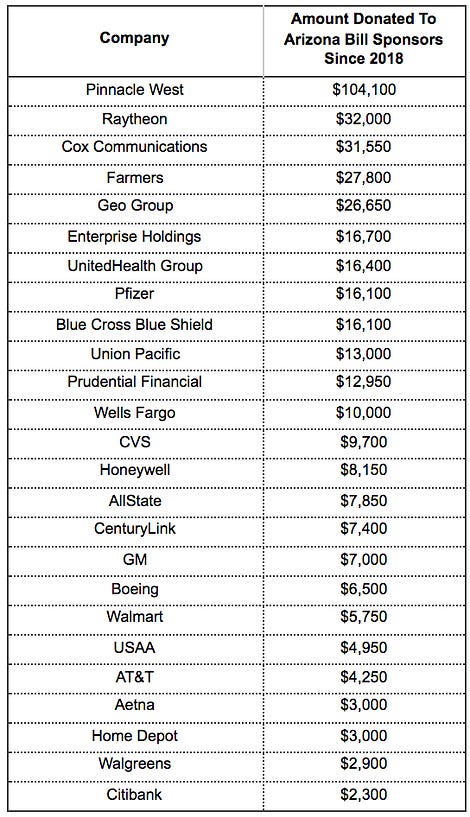Major corporations announce opposition to voter suppression bills in Arizona
Welcome to Popular Information, a newsletter about politics and power — written by Judd Legum and Tesnim Zekeria. Last November, Biden secured a narrow victory in Arizona, flipping a state that Trump had won four years earlier. Republicans in the Arizona legislature have responded with a flood of bills to restrict voting before the next election. The purpose of these bills is both to validate Trump's false claims of voter fraud and to make it more difficult for Democratic-leaning constituencies, particularly communities of color, to vote in 2022 and beyond. An investigation by Popular Information, encompassing thousands of Arizona campaign finance records filed over the last three years, reveals that the Republican elected officials sponsoring these bills are backed by hundreds of thousands in corporate donations. The Brennan Center has identified 22 bills introduced in the Arizona legislature that would restrict voting — the most of any state. One proposal with significant momentum is Senate Bill 1593, sponsored by Arizona Senator David Gowan (R). Gowan's bill, which has already been approved at the committee level, would significantly restrict mail-in voting, which is how about 80% of Arizona voters choose to vote. The bill would prohibit mail-in ballots from being sent out more than 22 days before an election, giving voters five fewer days to return their ballot. Further, Gowen's bill would invalidate any ballot that is not postmarked by the Thursday before the election, even if it is received by election officials prior to when the polls close on Election Day. Relying on postmarks is especially problematic because "mail-in ballots routinely arrive without a postmark or one that isn't legible." There has been no evidence that mail-in voting in Arizona was subject to fraud. Nor has Gowan explained why shrinking the time voters have to return their mail-in ballot would reduce fraud. But we do know that Republicans dominated in-person voting in 2020. By invalidating more mail-in votes, Gowen's bill would give Republicans an edge in future elections. Other bills introduced this year would require mail-in ballots to be returned in person, eliminate Arizona's permanent vote-by-mail list (known as the Permanent Early Voter List), and mandate that all mail-in votes be notarized. “These are voter suppression bills,” Arizona Senator Sally Ann Gonzales (D) said. In response to inquiries from Popular Information, two major corporations said they opposed the 22 bills introduced in the Arizona legislature to restrict voting. Over the last three years, Union Pacific donated $13,000 to 20 Arizona legislators that have sponsored bills to restrict voting. In a statement, Union Pacific said it "does not support these bills." Union Pacific has also suspended all political giving in the state. "Recent events have made us pause contributions and evaluate future contributions overall, including in Arizona," the company said. Prudential Financial told Popular Information that “it believes in ensuring Americans have equal access to the right to vote, and we do not support this legislation.” Since 2018, Prudential Financial has donated $12,950 to eight Arizona legislators currently sponsoring legislation to restrict voting. Prudential Financial has "suspended all contributions to candidates from its PACs" since the January riot at the Capitol. Other corporate donors, however, are staying quiet — including those that claim to champion voting rights. Cox Communications (Cox), for example, touts its commitment to "voting rights and justice for all" on its corporate website. In the run-up to the 2020 election, Cox partnered with Rock The Vote and Vote Safe 2020 to encourage people to exercise their voting rights. "[P]atriotism and civic duty is in our DNA," the company said in a tweet, "It’s our belief to do the right thing, always." Since 2018, Cox has donated $31,550 to Gowan and 24 other sponsors of voter suppression legislation in Arizona. Gowan and seven other bill sponsors supported by Cox attempted to overturn the results of the 2020 election based on Trump's false claims of voter fraud. They signed onto a "resolution urging Congress not to accept Arizona's legally cast electoral votes for Biden" and instead accept a slate of 11 fake electors pledged to Trump.
In February, Gowan proposed an amendment to the Arizona Constitution that would allow the legislature to ignore the voters and appoint its own slate of electors at any time. The proposal was derided as an "affront to our democracy" by Arizona social justice organization LUCHA Arizona. Popular Information asked Cox if it supported the bills restricting voting in Arizona or if it would continue to financially support Gowan and the other sponsors of those bills. The company did not respond. Cox is not alone. Popular Information's investigation found that, since 2018, corporations have donated $1.3 million to the sponsors of Arizona legislation to restrict voting. A significant portion of this money comes from prominent national corporations that publicly champion voting rights. Most ignored inquiries about their support of Arizona legislators pushing to restrict voting. The corporations backing Arizona legislators sponsoring voter suppression billsThe largest corporate sponsor of Arizona legislators seeking to restrict voting is Pinnacle West, a Phoenix-based company that owns the state’s largest utility company. Since 2018, Pinnacle West has donated $104,100 to 30 sponsors of Arizona's voter suppression bills. This amount includes $4,000 to State Representative John Fillmore, who proposed a bill to eliminate mail-in voting, except for those who cannot physically vote in person (HB 2701). Currently, Arizona voters do not need to provide an excuse when requesting a mail-in ballot. The bill would also drastically reduce the number of vote centers in each county. Maricopa County, for instance, “could only have 15 vote centers under the proposed law,” despite having over 100 voting centers during the last presidential election, The Arizona Republic reports. Pinnacle West also gave $4,500 to State Representative Mark Finchem who attended the January 6 riot at the Capitol. That day Finchem tweeted a photo with the caption “What happens when the People feel they have been ignored, and Congress refuses to acknowledge rampant fraud,” reports Azcentral. In February, it was discovered that Finchem had been corresponding with one of the organizers of the riot to discuss travel plans. Finchem is listed as a co-sponsor on three of the 22 bills. Pinnacle West Capital CEO Jeff Guldner is a member of Greater Phoenix Leadership, a group that represents over 100 of the leading CEOs in the state. On March 3, the business group published an op-ed condemning legislative efforts to restrict voting. “These efforts are misguided and must be defeated,” the group wrote. In January, following the riots at the Capitol, the group announced it would no longer financially support the state’s Republican party as well as elected officials who attempted “to reverse a fair and free election.” Pinnacle West did not respond to a request for comment. Farmers Insurance Group has donated at least $27,800 since 2018 to 24 Arizona legislators sponsoring voter suppression bills, including at least $1,200 to State Representative Kevin Payne. In January, Payne introduced a bill that would require all mail-in ballots to be notarized (HB 2369). Under Payne’s bill, ballots that are not notarized would be discarded. This added burden would make it harder for voters to cast their ballots, particularly minority and poor voters who may not have easy access to a notary. Payne is also the co-sponsor of HB 2370, a bill that seeks to eliminate the state’s permanent early voting list. Currently, voters in Arizona can sign up for the permanent early voting list and receive a mail-in ballot without having to request a new one each election. This list, reports Azcentral, represents “more than two-third — 68% to be exact — of Arizona voters.” Farmers Insurance Group did not respond to a request for comment. Blue Cross Blue Shield Association, one of the largest insurers in the country, has donated at least $16,400 to 22 Arizona legislators sponsoring voter suppression bills, including $200 to State Senator Kelly Townsend. At the end of January, Townsend introduced a bill, SB 1503, that would require voters who receive early, mail-in ballots to “deliver it by hand to a designated voting location.” According to the bill, early ballots received by mail would be considered invalid. During the election, Townsend repeatedly pushed baseless claims of election fraud on social media. “We removed God from our country. We kill millions of unborn people. How can we expect honesty from those promoting an anti-God, anti-Christ agenda? Do we really think they have integrity and will not seek to undermine our Republic?" Townsend tweeted on November 8, 2020. The tweet has since been deleted. Townsend also attended a “Stop the Count” protest outside the Arizona Capitol Building and asked for “real people” to watch the vote count. In December, she called upon the Arizona Attorney General to investigate “all claims” of election fraud. The attorney general declined her request. Blue Cross Blue Shield did not respond to a request for comment. Wells Fargo has donated at least $10,000 to 11 Arizona legislators sponsoring voter suppression bills. The company told Popular Information that it did not "have a comment on the bills." The company, which says it "believes that participation in the civic and political process is important," added that it has paused contributions “in light of recent events” as it reviews its political giving strategy. General Motors, which contributed at least $7,000 to three Arizona legislators sponsoring these bills, told Popular Information that it has “not taken a position” on the legislation. Below is a full list of the companies contacted by Popular Information, along with the amounts donated to the sponsors of the bills since 2018. You won't find the information in this edition of Popular Information anywhere else. That's because we are committed to doing whatever work is necessary to reveal how corporations influence politics at the federal, state and local level. We have a plan to comprehensively monitor corporate PAC activity in the months and years ahead. Bloomberg reported that Popular Information's work has brought a "political reckoning" to corporate America. But this is a two-person newsletter, and it is a massive undertaking. You can help Popular Information expand its capacity with a paid subscription. To stay completely independent, Popular Information accepts no advertising. This newsletter only exists because of the support of readers like you. |
Older messages
The white to vote
Tuesday, March 9, 2021
Georgia has allowed no-excuse absentee voting for all elections since 2005. It was part of a voting bill passed that year by the Republican-controlled legislature and signed into law by the Republican
The empire strikes back
Monday, March 8, 2021
Following the riot at the Capitol on January 6, dozens of major companies — including Amazon, AT&T, Disney, Microsoft, and Walmart — announced they were suspending PAC contributions to the 147
UPDATES: Voter suppression and corporate cash in Georgia
Thursday, March 4, 2021
Yesterday, Popular Information published an in-depth investigation on the corporate cash behind the Georgia legislators pushing voter suppression legislation. The report revealed that major
The Georgia legislators pushing voter suppression bills are backed by millions in corporate cash
Wednesday, March 3, 2021
A billboard in Atlanta, sponsored by Coca-Cola, honoring the life of Congressman John Lewis (D-GA), a civil rights icon who fought to expand voting rights. (Photo by Paras Griffin/Getty Images)
McConnell asks the Supreme Court to obliterate the Voting Rights Act
Tuesday, March 2, 2021
There is an avalanche of new voting restrictions being imposed by Republican legislators across the country. When Popular Information covered this issue in February, the Brennan Center had identified
You Might Also Like
GeekWire's Most-Read Stories of the Week
Sunday, January 12, 2025
Catch up on the top tech stories from this past week. Here are the headlines that people have been reading on GeekWire. ADVERTISEMENT GeekWire SPONSOR MESSAGE: GeekWire's special series marks
9 Things That Delighted Us Last Week: From Fleece Shellaclavas to Portable Sound Machines
Sunday, January 12, 2025
Plus: Ceremonia's new nonaerosol dry shampoo. The Strategist Logo Every product is independently selected by editors. If you buy something through our links, New York may earn an affiliate
LEVER WEEKLY: How To End This Disaster Movie
Sunday, January 12, 2025
We get to decide whether the LA fires are a wake-up call or a funeral pyre. How To End This Disaster Movie By David Sirota • 12 Jan 2025 View in browser View in browser A helicopter drops water on the
6 easy(ish) ways we’re resetting for the new year
Sunday, January 12, 2025
Future you will thank you View in browser Ad The Recommendation January 12, 2025 Ad How Wirecutter journalists reset for a fresh year An image of Wirecutter's picks for best kids backpacks, best
☕ Fannie and Freddie
Sunday, January 12, 2025
Can the NHL pull off outdoor games in Florida? Morning Brew January 12, 2025 | View Online | Sign Up | Shop Walking a bike on a snow-covered bridge in Amsterdam. Marcel Van Hoorn/ANP/AFP via Getty
DEI Loses Popularity, Death Toll Rises in LA, and a Special Kind of Library
Sunday, January 12, 2025
Meta is ending its key diversity, equity and inclusion programs, joining corporate giants Ford, McDonald's and Walmart that have pulled the plug on DEI initiatives. ͏ ͏ ͏ ͏ ͏ ͏ ͏ ͏
UW and computer science student reach truce in ‘HuskySwap’ spat
Saturday, January 11, 2025
Blue Origin set for first orbital launch | Zillow layoffs | Pandion shutdown | AI in 2025 ADVERTISEMENT GeekWire SPONSOR MESSAGE: GeekWire's special series marks Microsoft's 50th anniversary by
Cryptos Surrender Recent Gains | DOJ's $6.5 Billion Bitcoin Sale
Saturday, January 11, 2025
Bitcoin and other tokens retreated as Fed signaled caution on rate cuts. Forbes START INVESTING • Newsletters • MyForbes Presented by Nina Bambysheva Staff Writer, Forbes Money & Markets Follow me
Just Buy a Balaclava
Saturday, January 11, 2025
Plus: What Raphael Saadiq can't live without. The Strategist Every product is independently selected by editors. If you buy something through our links, New York may earn an affiliate commission.
Up in Flames
Saturday, January 11, 2025
January 11, 2025 The Weekend Reader Required Reading for Political Compulsives 1. Trump Won't Get the Inauguration Day He Wanted The president-elect is annoyed that flags will be half-staff for





